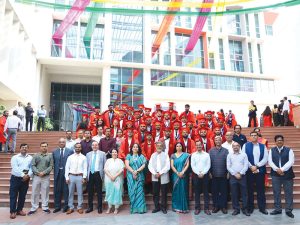21 Higher education leaders racing to develop india’s high-potential human resource: Swati Munjal
Swati Munjal
President, BML Munjal University, Gurugram

A commerce and business management alumna of Delhi and Cornell (USA) universities who acquired valuable work experience in PricewaterhouseCoopers and Whirlpool, Swati Munjal is President, BML Munjal University (BMU), Gurugram.
What are the major objectives set for BMU until India’s Freedom Centenary year?
BML Munjal University aspires to become a key contributor to the vision of Viksit Bharat 2047 by nurturing ethical, entrepreneurial, and socially responsible leaders. Anchored in our Vision 2030, we are committed to developing the spirit of inquiry, self-esteem, and responsible leadership — empowering students not just for careers, but for meaningful impact on society.
How satisfied are you with your progress thus far?
We are encouraged. BMU is a values-driven, student-centric institution with a strong culture of introspection, innovation, and academic rigour. From a standing start, we now have a vibrant, multi-disciplinary university with over 3,000 students, diverse study programmes, and growing recognition in government, academia, and industry. Our consistent focus on access, inclusion, and personalised learning is reflected in rising women’s enrolment, increased scholarship support, and flexible learning pathways.
That said, ten years is a short period in the life of a university. We remain a work in progress, but are confident that we’ve laid a strong foundation rooted in the right values.
What are BMU’s major initiatives to contemporise syllabus /curricula?
At BMU, curriculum development is driven by the belief that meaningful education must be rooted in real-world relevance and societal impact. A key initiative in this direction is the integration of rural immersion across all study programmes. Students engage deeply with grassroots communities to identify challenges and co-create sustainable solutions. These experiences not only enhance empathy and social sensitivity, but also develop critical thinking and entrepreneurial problem-solving skills —vital for nurturing the spirit of inquiry and responsible leadership. In parallel, our strong industry engagement framework embeds active learning into the curriculum.
How satisfied are you with your connect with Indian industry and business?
A strong and sustained connect with Indian industry and the social sector is perhaps BMU’s greatest strength. Through our Practice School model, students directly engage with companies working on live industry projects and rural immersions, acquiring real-world exposure to business and societal challenges. We work closely with 150-200 companies, and our partnerships are reflected in our industry-integrated curriculums and strong placement outcomes, with a growing number of recruiters across diverse sectors participating in campus hiring.
R&D and innovation are widely perceived as Indian academia’s infirmity. What’s your institutional response to create new knowledge?
At BMU, we have taken a comprehensive approach to address traditional gaps in R&D and innovation within Indian academia. Significant financial and administrative support — including research infrastructure, seed grants, professional development allowances, and incentives for high-quality publications — has created a robust foundation for faculty-led interdisciplinary research. Moreover our Institute of Innovation and Entrepreneurship (I2E) and ACIC-BMU Propel serve as dynamic hubs for translating ideas into impact, offering pre-incubation, mentoring, seed funding, and exposure to national platforms.
What’s your prescription for transforming India into a $30 trillion GDP economy by 2047?
The journey to becoming a $30 trillion economy by 2047 must be anchored in developing human capital that is future-ready, innovative, and socially conscious. We are firm in our belief that education must not produce mere job seekers, but also job creators and changemakers. Our prescription is to reimagine higher education as a catalyst for economic and social transformation. To achieve the $30 trillion goal, India must enable university-driven entrepreneurship, boost public and private investment in R&D, and ideate policy frameworks that reward knowledge creation, innovation, and social impact.
Also Read: BML Munjal University announces 3rd Law Conclave on regulating AI in India
















Add comment